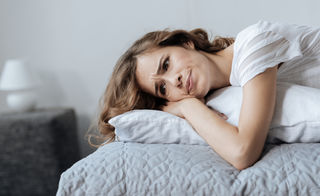
Sleep
How Much Sleep Should You Be Getting?
The current understanding of the relationship between sleep and mental health.
Posted May 15, 2018 Reviewed by Devon Frye
The Social Brain Blog interviewed sleep expert Dr. Sigrid Veasey at the Third Annual Brain Health and Performance Summit, presented by the Ohio State University Wexner Medical Center Neurological Institute and the Stanley D. and Joan H. Ross Center for Brain Health and Performance.

Social Brain Blog (SBB): What is the current understanding of the relationship between sleep and mental health?
Sigrid Veasey: There are many different components. Alertness, attention, motivation, perception, compassion, and rational behavior are all factors influenced in various mental health conditions, and all can be affected by sleep. I think what we’re realizing now is that sleep loss early in life can have lasting changes on your neural connectivity. This may ultimately be an important factor in schizophrenia, depression, bipolar disease, and general anxiety disorders, in addition to genetics and other environmental factors. It’s possible that it could be because of one of these early-life sleep changes. It’s something we’ve never really thought about before.
What we’re starting to realize is that the brain responds to things really slowly, and from an insult at an early age, you can lose connectivity gradually. From our work with sleep deprivation, we know that the amygdala is one of those areas that gets injured by sleep loss. The amygdala is intimately involved in anxiety responses, mood and memory, and how you act upon something—it has a big role in memory and mood.
SBB: Can someone function on three-and-a-half hours of sleep a night? Are there people who are more resistant to the effects of sleep deprivation, or does the connection between sleep and brain health apply to everyone?
SV: There are beautiful data that come from the psychologist David Dinges at the University of Pennsylvania who looks at neurobehavioral impairments in response to chronic sleep deprivation. His work shows that on the first night of sleep deprivation, subjects will say: “Oh, I feel awful. This is terrible.” The second night of sleep deprivation, they’ll say: “I’m a teeny bit worse, but maybe not by much.” The third night, they’ll say: “I’m not sure I notice any difference, or feel any different than yesterday.” You can look at how they’re deteriorating in performance each day, in parallel with the length of prolonged wakefulness.
In other words, you become a really bad judge of your own state. I can remember back in my medical training when we would work in the intensive care unit, people would say: “Don’t worry, your first few nights when you’re on call will be terrible, but you’ll get used to it." But there’s zero evidence that you get used to it. You feel subjectively that you have gotten used to it, but there is absolutely no evidence that you actually do get used to it and a lot of evidence for the contrary.
What I would say to a three-and-a-half-hour-a-night sleeper is this. You might be one of those genetically lucky people who only needs that much sleep. That is remotely possible. But it’s far more likely that this has become your new norm. There are chronic diabetics who are walking around with a glucose of 600. I would be comatose with a glucose of 600. But these patients have just slowly gotten there over a long time, and so they don’t really notice the difference. They feel OK. Same thing with asthmatics. Asthmatics can have barely any movement of airflow and think it is normal. Sleep is the same way. Deprivation becomes your chronic new norm. If you are sleeping in on weekends, you are not getting enough sleep during the week.
SBB: So what are some of the most dangerous misconceptions about sleep?
SV: People who are desperate to get good, quality sleep will sometimes take anything. Perhaps someone might take a combination of sleeping pills, opiates, and alcohol because they are desperate to get a good night’s sleep. But there’s no such thing as medicated sleep that actually works as well as natural sleep.
Alcohol is actually one of the things that messes up people’s sleep more than anything else. The first thing I always tell patients is just to do a test: Take yourself gradually off of any alcohol, day or night, and then see your sleep quality. Do you have to get up as frequently in the nighttime to go to the bathroom? Are you awake less at night? Do you end up feeling more refreshed in the daytime? Those are just things to think about. It won’t make a difference for every patient, but it makes a huge difference for many, and the same would be true for opioids: slowly wean and then reassess sleep quality.
SBB: How important is it to go to sleep at the same time every night?
SV: There are two major influences regulating sleep in healthy people. One is circadian—it is the right time for you to sleep. A young person might sleep best from 2 a.m. until 10 a.m. For older people, it may be earlier. But there is a real circadian clock that has set the best time for you to sleep. At the same time, there is a circadian pro-wakefulness influence that will inhibit your sleep. For example, it would be nearly impossible for me to sleep in the daytime. The other part that makes a big difference is the homeostatic factor. The longer you have been awake, the greater the drive to sleep. Taking naps in the afternoon blunts this drive and lessens sleep depth at night. On the other hand, if you are having difficulty falling asleep, take advantage of homeostatic drive and go to bed later and spend just seven hours in bed.
No one has really done a study that says your bedtime has to be within an hour or within two hours every night. You sometimes hear advice like: Pick a bedtime, and that’s your bedtime for the rest of your life. And you think: Come on, is that really realistic?
If you think about sleep as being on this circadian rhythm, with homeostatic drive going up on a gradual slope, there's not going to be a window where you have to get to sleep within an hour each night, or it’s not going to work. You have some flexibility in time on either side of a two-hour window for going to bed, but you do not have a six-hour window.
SBB: What’s the impact of light on sleep?
SV: There are acute and chronic effects, we believe. The acute effect is that light at the lower frequencies can be directly alerting and can also shift circadian time at different points of the 24-hour circadian cycle. During parts of your circadian cycle, any extra hours of light will suppress melatonin, so that your overall melatonin levels are lower. When you have less melatonin, you can have less of an ability to fight off certain cancers and also have fewer antioxidants. There is indeed a health component to sleeping in darkness—that is, real legit darkness.
Dr. Ulysses Magalang of Ohio State University found that just having a nightlight in the room actually increased insulin resistance and increased weight in humans, and does the same thing in mice—it turns pre-diabetic mice into frank diabetic mice. That little teeny bit of light can be enough to knock down really important rhythms and profoundly influence health.
SBB: Should we be waking up at a certain time? Is sleeping in a good idea or a bad idea?
SV: Because sleep is controlled by circadian and homeostatic factors, you absolutely cannot get too much sleep. You can feel sort of that drunken kind of hangover thing if you sleep in late on weekends, but your body needs that sleep. That tired feeling after sleeping for a long time means you went into deep sleep, and you’re still in a sleep inertia phase where you’re not fully kicked out of that sleep. If you can, you should sleep in. But don’t make a practice of this; sleeping in just means you are not getting enough sleep during the week.
Our research in my lab at Penn really breaks the myth that you can just reduce your sleep time during the week and then catch up on the weekend. Our work in a mouse model does show that the mice will get lasting neural injury and neuron loss in specific groups of neurons with sleep loss. We have to start thinking about sleep differently. The neurons lost include locus coeruleus neurons, which when injured in animal models can exacerbate Alzheimer’s pathology. Thus, it is possible that short sleep early in life could hasten the onset of Alzheimer’s.
Our main goal is to figure out the molecular mechanisms to protect neurons. We have to discover how to provide the best protection for the brain for sustained wakefulness. And I think there will be other interventions that come around the pike where people just figure out how to build in nap time.
SBB: Should we all nap?
SV: It’s unclear. If you nap, you will reduce your homeostatic drive, and so your nighttime sleep will be worse. That’s always the gamble. You just have to figure out what works best for you. But if you’re working double shifts, and you have a long commute, you probably are better off having a two-hour nap here and there.
The real stress on the brain that predicts poor performance, is the amount of time spent awake. That makes sense. With these wake-activated neurons, if they have to just be constantly active and are starting to develop oxidative stress, and proteins are misfiring, then it means that being awake for a really long time is probably a bad thing. But we just don’t know how long naps need to be. Is a nap of two hours sufficient to allow the neurons to correct themselves and reset? We just don’t know that yet.
Sigrid Veasey, M.D., is a professor at Perelman School of Medicine at the University of Pennsylvania and the Center for Sleep and Circadian Neurobiology, where she studies sleep disorders and sleep disruption.
LinkedIn Image Credit: TheVisualsYouNeed/Shutterstock



